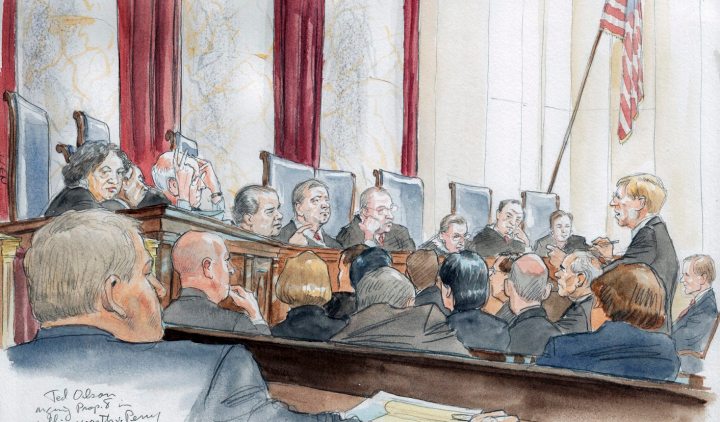Newsdeck
ANALYSIS: Wider Legal Rights At Stake In U.S. Gay Marriage Cases

As the U.S. Supreme Court prepares to take up same-sex marriage next month, laws barring recognition of such unions are not the only issue hanging in the balance. The very question of whether gay people constitute a vulnerable group that needs the court's help in asserting equal rights is also at stake. By Lawrence Hurley.
Ahead of two high-profile oral arguments in March, backers of gay rights and defenders of more traditional marriage are zeroing in on whether courts should be wary of any laws that target gay people.
The underlying question is whether bans on gay marriage violate the U.S. Constitution’s guarantee of equal protection under the law.
The Obama administration is due to weigh in by Friday, its deadline for written submissions in a case questioning the constitutionality of a central part of the 1996 federal Defense of Marriage Act (DOMA), which defines marriage under federal law as being between a man and a woman.
The other case before the nine-member court asks the justices to consider whether Proposition 8, a California ballot initiative that outlawed same-sex marriage, should be struck down. The cases will be argued on March 26 and 27. A ruling is expected by the end of June.
It’s unclear how the court will rule, but conventional wisdom is that Justice Anthony Kennedy, the most moderate justice on the conservative wing of the court, will be a deciding vote.
While the court has no obligation to address the bigger gay rights issues raised in the cases, if it does, the justices would first have to consider whether gay people merit the same protections as some other groups that have experienced discrimination.
That finding determines what standard the court will adopt in reviewing the law in question. If it deems that a particular group merits protection, the justices will look at the statute with a more skeptical eye and are more likely to strike it down.
Court rulings in the past have held that, in the face of discrimination, classifications based on race, national origin and gender all require closer “scrutiny,” the term the court invokes in discrimination cases.
Any ruling that laws affecting gay people require tough scrutiny has implications that go beyond the two cases before the court. It could influence future cases involving not just gay marriage but also any laws seen to infringe upon gay rights.
“It would be an invitation for lawsuits to pop up in every state of the union,” said gay rights legal expert William Eskridge, a Yale Law School professor who is filing a brief urging that the California law be struck down.
Not only would same-sex marriage bans be more legally suspect, but also laws relating to other family matters involving such issues as adoption or custody, he said.
There has been a long history of laws targeting gays and lesbians, gay rights activists say. Homosexual conduct was for a long time illegal in many states.
More recently, various states have passed laws that critics say aim to counter the rise of the gay rights movement.
In 2011, for example, Tennessee enacted a law that stripped local governments of their ability to pass stricter anti-discrimination ordinances. Gay rights activists say it was designed specifically to invalidate a Nashville law that provided protections on the basis of sexual orientation.
SPECIAL PROTECTION
The level of scrutiny varies based on the protected group, with the most stringent, known as “strict scrutiny,” reserved for classifications based on race. Distinctions based on gender prompt a lower level of review known as “intermediate scrutiny.”
Legal experts don’t think the court will opt for the highest level of scrutiny, but even if the justices do pick something along the lines of the second option, it would mean they would look at DOMA and Proposition 8 with more suspicion, meaning they would be more likely to strike them down.
Alternatively, the court could find that gay people don’t warrant special protection. In that case, both laws might have a greater chance of surviving court review.
DOMA supporters point out that in the past, the court has declined to extend special protections to the impoverished, the elderly and those with mental disabilities, among other groups.
As John Eastman, a law professor at Chapman University who has filed a brief in support of Proposition 8, put it, “it makes it a more uphill battle” for his side if the court believes gay people constitute a protected group.
What the Obama administration says in its DOMA brief in the coming week is of particular importance because the court traditionally pays some deference to what the executive branch says.
The case focuses on whether Edith Windsor, who was married to a woman, could get the federal estate tax deduction available to heterosexuals when their spouses pass away.
Gay rights supporters are hoping the U.S. Justice Department will argue in favor of tough scrutiny of any laws targeting gay people.
“It would be a very strong statement that gay people have really suffered a history of discrimination,” said Susan Sommer, a lawyer with Lambda Legal.
UNCONSTITUTIONAL?
The Justice Department has already said it believes DOMA is unconstitutional. Solicitor General Donald Verrilli is expected to argue – as he has previously – that laws affecting gay people should face some kind of “heightened scrutiny,” a catch-all phrase to refer to any type of enhanced review.
DOMA’s defenders before the court, a group of Republicans in the U.S. Congress, say the court should adopt the lowest standard of review, which would not categorize gay people as a group in need of protection.
Their lawyer, Paul Clement, noted in his already filed brief on the issue that the Supreme Court has previously applied the lowest standard of review to matters involving sexual orientation.
The first instance, in 1996, concerned a Colorado law that sought to prevent gay people from being able to assert rights based on sexual orientation. The second, in 2003, focused on a Texas law that criminalized sexual conduct between same-sex couples. In both cases, the court – in opinions written by Justice Kennedy – struck down the statute in question.
But in neither case was marriage the issue.
There are several rational reasons for defining marriage as between one man and one woman, Clement said, including the “unique relationship between marriage and procreation that stems from marriage’s origins as a means to address the tendency of opposite-sex relationships to produce unintended and unplanned offspring.”
Although the Justice Department brief is in the DOMA case, lawyers involved in the litigation think what the solicitor general says on behalf of the Obama administration could influence the court’s consideration of Proposition 8.
The federal government is not a party in the latter case, but it does have the option of filing a friend of the court brief before a Feb. 28 deadline. The Justice Department has left lawyers guessing as to whether it will take a stand. DM
Photo: U.S. Supreme Court Justices Chief Justice John Roberts, Anthony Kennedy, Ruth Bader Ginsburg, Stephen Breyer, Sonia Sotomayor and Elena Kagan (L-R) await the start of President Barack Obama’s State of the Union speech on Capitol Hill in Washington, February 12, 2013. REUTERS/Charles Dharapak/



















 Become an Insider
Become an Insider